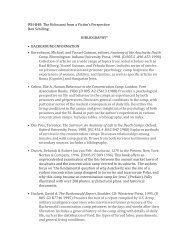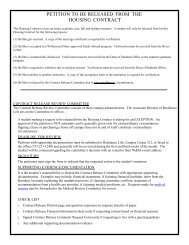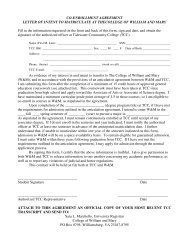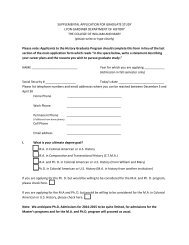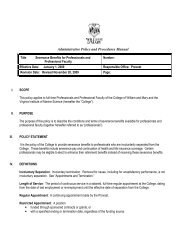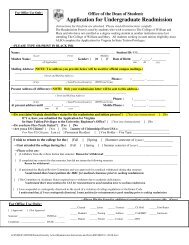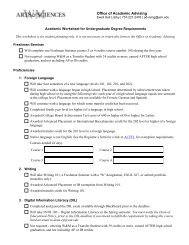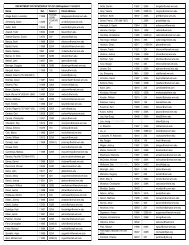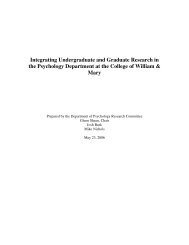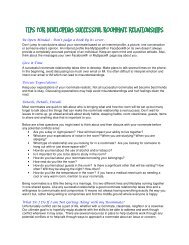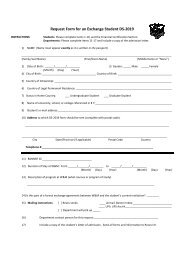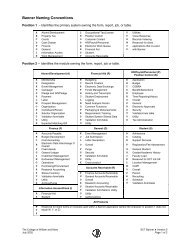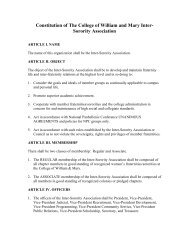Course Selection Guidebook [pdf] - College of William and Mary
Course Selection Guidebook [pdf] - College of William and Mary
Course Selection Guidebook [pdf] - College of William and Mary
You also want an ePaper? Increase the reach of your titles
YUMPU automatically turns print PDFs into web optimized ePapers that Google loves.
<strong>Course</strong> <strong>Selection</strong> <strong>Guidebook</strong> – Fall 2011150W. Introduction to Film Studies – (GER 5) Fall (4) A freshman seminar in film as anindependent aesthetic form, treating the formal <strong>and</strong> narrative components <strong>of</strong> film <strong>and</strong> brieflyintroducing students to the history <strong>of</strong> film <strong>and</strong> the comparison <strong>of</strong> films made in the United Stateswith those made in other countries. This course satisfies the freshman writing requirement.250. Introduction to Film Studies –(GER 5) Fall (4) An introduction to film as an independentaesthetic form, treating the formal <strong>and</strong> narrative components <strong>of</strong> film <strong>and</strong> briefly introducingstudents to the history <strong>of</strong> film <strong>and</strong> the comparison <strong>of</strong> films made in the United States with thosemade in other countries. Shares the same course content as Film 150W, but designed for studentswho have either 150W or 250 for the Film Studies minor; <strong>and</strong> they may not take both courses forcredit.Beyond Literary <strong>and</strong> Cultural Studies 201 <strong>and</strong> Film 150/250, relevant introductory courses willdepend on the individual focus <strong>of</strong> the Literary <strong>and</strong> Cultural Studies major. Students should be sureto take prerequisites for upper level courses in their first few semesters.Interested students should consult a member <strong>of</strong> the Literary <strong>and</strong> Cultural Studies AdvisoryCommittee: Colleen Kennedy(Director/English); Anita Angelone (Modern Languages)VarunBegley (English); Troy Davis (Swem Library Media Center); Simon Joyce (English), ArthurKnight (English/American Studies); Rich Lowry (English); Christopher MacGowan (English);Charles Palermo (Art History); Sasha Prokhorov (Modern Languages); Elena Prokhorova (ModernLanguages); Ann Marie Stock (Modern Languages); Sharon Zuber (English).MathematicsThe Mathematics Department <strong>of</strong>fers a number <strong>of</strong> different courses that are <strong>of</strong>ten taken byincoming freshmen. Those with a possible career interest in mathematics, computer science, thenatural sciences, or economics will want to pursue the main calculus <strong>and</strong> linear algebra sequence:Mathematics 111-112-211-212. These courses are prerequisite to most advanced courses inmathematics as well as to certain courses in physics <strong>and</strong> chemistry. Special versions <strong>of</strong> 111 <strong>and</strong>112, called 131 <strong>and</strong> 132, are available for students interested in the life sciences.Many students will fulfill the GER 1 requirement with a course taken in the MathematicsDepartment. There are four st<strong>and</strong>ard possibilities: Mathematics 104, an introduction to theelementary mathematics <strong>of</strong> airplane flight; Mathematics 106, an introduction to probability <strong>and</strong>statistics that does not require calculus; Mathematics 108, a course in applied calculus;Mathematics 111, the first semester <strong>of</strong> the main calculus sequence. In unusual circumstances, itmay be appropriate for a student to take Mathematics 112 without credit in Mathematics 111.Mathematics 112 also earns GER 1 credit. Admission to the School <strong>of</strong> Business requires credit forone semester <strong>of</strong> calculus. For this purpose, Mathematics 108 or Mathematics 111 or Mathematics131 will suffice.Neither Mathematics 104 nor Mathematics 106 has any formal prerequisite. Reasonablefamiliarity with high school algebra is ordinarily sufficient. Students who want to takeMathematics 108 should have a good underst<strong>and</strong>ing <strong>of</strong> polynomial <strong>and</strong> exponential functions.Mathematics 108 will cover a broader range <strong>of</strong> topics than is taken up in Mathematics 111, whichfocuses more on conceptual issues. In addition to the algebra skills mentioned for Mathematics108, the high school background appropriate for enrollment in Mathematics 111 should includework in trigonometry.55


![Course Selection Guidebook [pdf] - College of William and Mary](https://img.yumpu.com/46952524/55/500x640/course-selection-guidebook-pdf-college-of-william-and-mary.jpg)
